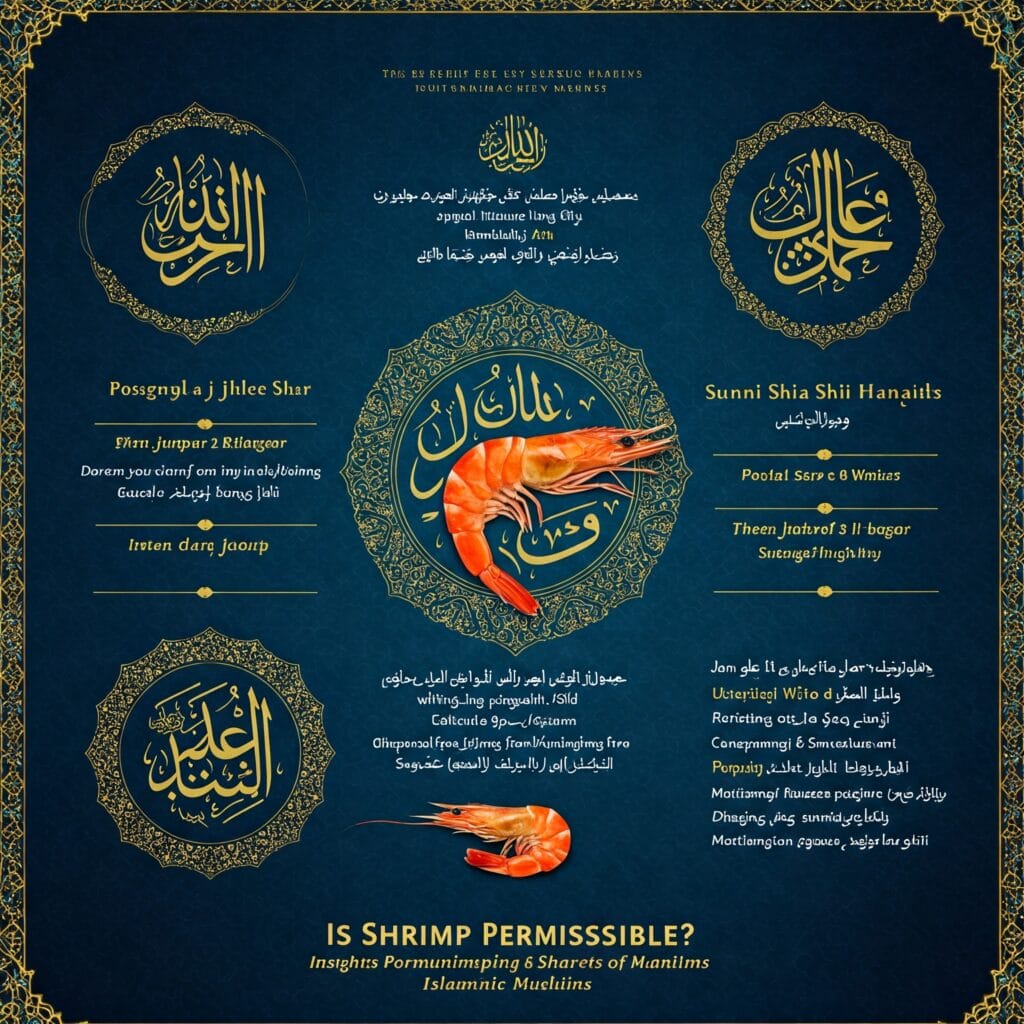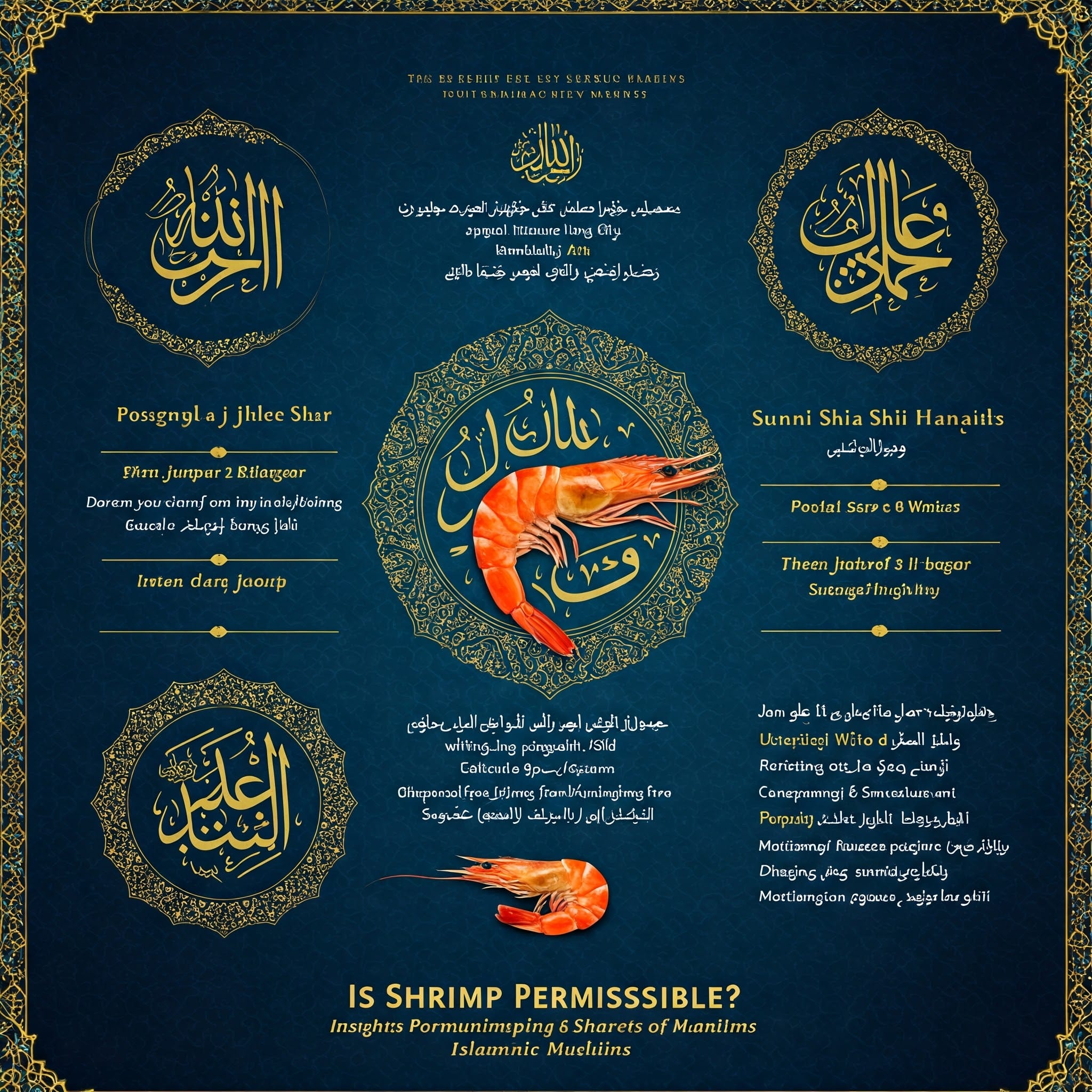The question of whether shrimp is halal (permissible) or haram (forbidden) in Islam is a topic of significant debate among Muslim scholars and communities, reflecting the diversity of Islamic jurisprudence. With over 1.9 billion Muslims worldwide as of 2025, dietary laws play a central role in daily life, guiding what is permissible to consume under Islamic principles. Shrimp, a popular seafood known for its nutritional value, is particularly contentious due to differing interpretations of Quranic verses, Hadith, and scholarly traditions across Sunni and Shia schools, especially within the Hanafi madhab. This article provides an in-depth exploration of the permissibility of shrimp consumption, examining the perspectives of Sunni, Shia, and Hanafi Muslims, supported by primary Islamic sources, scholarly opinions, and cultural practices.

Overview: Shrimp and Islamic Dietary Laws
Islamic dietary laws, derived from the Quran and Sunnah (practices and sayings of Prophet Muhammad, peace be upon him), categorize food as halal or haram. Seafood is generally addressed in the Quran, which states: “Lawful to you is what you catch from the sea and use it for food as provision for yourselves and for travelers…” (Quran 5:96). A Hadith in Sahih Muslim further clarifies: “Its [sea] water is pure, and its dead animals are lawful (halal)”. These texts form the foundation for most scholars’ rulings on seafood, but interpretations vary, particularly for crustaceans like shrimp, which differ biologically from traditional fish.
Shrimp, a decapod crustacean, is rich in protein, omega-3 fatty acids, and vitamins, making it a dietary staple in many Muslim-majority regions, such as Indonesia, Malaysia, and the Gulf states. However, its classification as a “fish” or “non-fish” creature sparks debate, especially in the Hanafi school, which is predominant in South Asia. This article delves into the positions of Sunni schools (Shafi’i, Maliki, Hanbali, Hanafi), Shia traditions (Ja’fari, Usuli, Akhbari), and the cultural and scientific factors influencing these rulings.
Sunni Perspectives on Shrimp
Sunni Islam encompasses four major schools of jurisprudence: Shafi’i, Maliki, Hanbali, and Hanafi. Each interprets the permissibility of shrimp based on Quranic verses, Hadith, and traditional understandings.
Shafi’i, Maliki, and Hanbali Schools
The Shafi’i, Maliki, and Hanbali schools generally consider all sea creatures, including shrimp, to be halal. Their ruling is based on the broad interpretation of Quran 5:96 and the Hadith in Sahih Muslim, which permit all “sea game” without restriction. These schools argue that the sea is inherently pure, and no explicit prohibition in the Quran or authentic Hadith excludes shrimp or other crustaceans. Scholars like Imam Malik and Imam Ahmad ibn Hanbal emphasize that all aquatic animals are permissible unless proven harmful or explicitly forbidden.
- Evidence: The Hadith stating “its dead animals are lawful” implies that seafood, including shrimp, does not require ritual slaughter, unlike land animals, simplifying its permissibility.
- Cultural Context: In regions like Indonesia and Malaysia, where Shafi’i and Maliki schools dominate, shrimp is a staple in dishes like laksa, reflecting widespread acceptance.
Hanafi School
The Hanafi school, followed by many Muslims in South Asia, Turkey, and parts of the Middle East, is more restrictive. Hanafi scholars traditionally classify sea creatures into two categories: fish (samak) and non-fish. Only creatures considered “fish” are halal, defined by what Arabs at the time of revelation recognized as fish, based on appearance and characteristics like fins and scales.
- Traditional Hanafi View: Many Hanafi scholars deem shrimp haram or makruh tahrimi (strictly detestable, akin to haram) because shrimp are crustaceans, not fish with scales or backbones. They cite a Hadith attributed to the Prophet: “All amphibious animals are forbidden” (Sahih Bukhari), interpreting shrimp as amphibious due to their ability to live in water and briefly on land. Additionally, texts like Jawaahir suggest small sea creatures resembling worms or insects, like shrimp, are makruh tahrimi.
- Modern Hanafi Opinions: Some contemporary Hanafi scholars, such as Mufti Taqi Uthmani, argue that shrimp may be halal based on historical Arab classifications that considered shrimp a type of fish (irbiyaan), as noted in dictionaries like Qaamoos and Taajul Uroos. They emphasize that scientific classifications (e.g., shrimp as crustaceans) should not override customary understandings from the Prophet’s era. Mufti Uthmani advises leniency, stating there should be no “staunchness” on this issue due to valid differences of opinion.
- Cultural Influence: In Hanafi-dominant regions like India and Pakistan, shrimp consumption is less common, but globalization and halal certifications have led to growing acceptance among some communities.
Shia Perspectives on Shrimp
Shia Muslims, primarily following Ja’fari jurisprudence (including Twelver and Ismaili sects), have distinct dietary rulings. The Ja’fari school permits shrimp but is stricter on other seafood.
- Ja’fari School: Shrimp is halal, alongside fish with scales, as it is considered an edible aquatic crustacean. This ruling aligns with the Quran’s permissibility of seafood (Quran 5:96) and is supported by scholars like Sayyed Mohammad Al-Musawi, who state that shrimp is halal for both Sunni and Shia sects. However, other crustaceans like crabs and lobsters are haram because they lack scales, a criterion emphasized in Ja’fari fiqh.
- Usuli and Akhbari Traditions: In the Usuli school, shrimp is halal, as it is not explicitly prohibited in Hadith, and the absence of scales is not a barrier for shrimp specifically. Conversely, the Akhbari school considers shrimp makruh (disliked) due to its lack of scales, reflecting a more cautious approach.
- Scholarly Opinions: Ayatollah Ali al-Sistani, a prominent Shia scholar, has issued fatwas permitting shrimp and prawns, reinforcing their halal status in Ja’fari fiqh.
Hanafi Muslims: A Deeper Dive
The Hanafi school’s nuanced stance on shrimp warrants closer examination, as it is the most debated among Sunni perspectives.
- Classical Position: Hanafi scholars like Imam Abu Hanifa restricted halal seafood to fish (samak), defined as creatures with backbones, fins, and gills, based on the Hadith: “Two types of animals which have died a natural death have been permitted to us, fish and locust” (Sunan Ibn Majah 3218). Shrimp, lacking a backbone and breathing through gills differently, are often classified as non-fish, thus haram or makruh tahrimi.
- Dissenting Views: Some Hanafi scholars, including Maulana Ashraf Ali Thanwi and Mufti Abdur Raheem Lajpuri, permit shrimp, arguing that prawns and shrimp were historically considered fish (samak) by Arabs, as evidenced in classical texts like Hayyatul Hayawaan by Allama Dameeri. This view aligns with the Quranic principle that everything from the sea is permissible unless explicitly prohibited.
- Makruh Debate: Within some Hanafi communities, particularly in Bengal, shrimp is considered makruh (disliked but not haram), a position that may stem from reconciling conflicting opinions rather than a formal scholarly ruling. However, no historical Hanafi texts explicitly classify shrimp as makruh; it is typically deemed either halal or haram.
- Modern Context: The rise of halal certification bodies, which often approve shrimp based on broader scholarly consensus, has influenced Hanafi Muslims in urban areas to accept shrimp, especially in regions with diverse culinary practices.
Cultural and Scientific Influences
Cultural practices significantly shape attitudes toward shrimp consumption:
- Muslim-Majority Countries: In Shafi’i and Maliki-dominated regions like Malaysia and the Gulf states, shrimp is a dietary staple, integrated into local cuisines without controversy. In contrast, Hanafi communities in South Asia may avoid shrimp due to traditional rulings, though younger generations are increasingly open to it due to globalization.
- Scientific Classification: Modern biology classifies shrimp as crustaceans, distinct from fish due to their exoskeleton and lack of a backbone. Some Hanafi scholars use this to argue shrimp’s impermissibility, while others prioritize historical Arab classifications over contemporary science.
- Health Benefits: Shrimp’s nutritional profile (high in protein, low in fat) supports its acceptance, as Islam encourages consuming wholesome foods. However, concerns about toxins in certain seafood may lead to caution, though this applies to all seafood, not shrimp specifically.
Halal Certification and Globalization
Halal certification bodies play a pivotal role in standardizing dietary laws for global Muslim consumers. Many agencies, such as the Islamic Services of America (ISA), approve shrimp, reflecting the majority view (Shafi’i, Maliki, Hanbali, and some Hanafi and Shia scholars) that shrimp is halal. These certifications consider Quranic permissibility, Hadith, and widespread cultural acceptance, making shrimp accessible in international markets, including processed and frozen products.
However, uncertified seafood raises concerns due to potential adulteration or cross-contamination, prompting Muslims to seek trusted vendors or halal-certified products. For example, brands like Peter Pan Seafood offer halal-certified shrimp and salmon, catering to diverse Muslim populations.
Controversies and Misconceptions
- Misconception: Shrimp is universally haram in Hanafi fiqh.
Clarification: While many Hanafi scholars deem shrimp haram or makruh, others permit it based on historical classifications, and no absolute consensus exists. - Misconception: Shrimp is haram because it’s a bottom-dweller or scavenger.
Clarification: The Quran and Hadith do not prohibit seafood based on diet or habitat. This concern applies more to lobsters in some Shia rulings, not shrimp. - Controversy: A 2018 fatwa by Jamia Nizamia in Hyderabad declared prawns and shrimp makruh tahrimi, sparking debate. Many scholars, including those from Darul Uloom Deoband, countered that shrimp is halal, highlighting the diversity of opinions.
Practical Guidance for Muslims
Given the diversity of opinions, Muslims can navigate the shrimp debate by:
- Following Their Madhab: Adhere to the rulings of your school (e.g., Shafi’i permits shrimp, Hanafi may prohibit). Consult local scholars for clarity.
- Seeking Leniency: Hanafi Muslims may adopt the Shafi’i or Maliki view if permitted by reliable scholars, as differences of opinion allow flexibility.
- Checking Certifications: Opt for halal-certified shrimp to ensure compliance with Islamic standards, especially for processed products.
- Avoiding Doubt: If uncertain, avoid shrimp, as Islam encourages avoiding doubtful matters. Allah has provided many clear halal alternatives.
Pros and Cons of Shrimp Consumption
Pros:
- Broadly halal in Shafi’i, Maliki, Hanbali, and Ja’fari schools, supported by Quran 5:96 and Hadith.
- Nutritionally beneficial, offering protein, omega-3s, and vitamins.
- Widely accepted in Muslim-majority countries, enhancing culinary diversity.
- Halal certifications simplify access in global markets.
Cons:
- Prohibited or makruh in traditional Hanafi rulings, causing confusion for followers.
- Lack of consensus in Hanafi fiqh may lead to doubt or community disputes.
- Uncertified shrimp may raise concerns about processing or contamination.
Verdict: A Matter of Jurisprudential Diversity
The permissibility of shrimp in Islam reflects the rich diversity of Islamic jurisprudence. The Shafi’i, Maliki, and Hanbali schools, along with the Ja’fari Shia tradition, overwhelmingly consider shrimp halal, citing Quranic permissibility and Hadith that allow all sea creatures. The Hanafi school, however, is divided, with traditional scholars deeming shrimp haram or makruh due to its non-fish classification, while modern scholars like Mufti Taqi Uthmani permit it based on historical Arab customs. Cultural practices and halal certifications further influence acceptance, particularly in globalized contexts.
For Muslims, the decision to consume shrimp depends on their madhab, scholarly guidance, and personal comfort with differing opinions. Those following Shafi’i, Maliki, Hanbali, or Ja’fari fiqh can confidently enjoy shrimp, while Hanafi Muslims may exercise caution or seek leniency from other schools. Ultimately, the debate underscores Islam’s flexibility, allowing adherents to navigate dietary laws with informed choices, ensuring adherence to faith while embracing culinary diversity in 2025 and beyond.
Must read:
- Dua Qunoot in Witr Prayer: English Translation, Significance, and Advantages
- Unlock Islam’s Secrets: Mind-Blowing Islamic Knowledge Awaits Everyone!
FAQs
u003cstrongu003eIs shrimp halal in Islam?u003c/strongu003e
Shrimp is generally considered halal in the Shafi’i, Maliki, Hanbali, and Ja’fari (Shia) schools, based on Quran 5:96 and Hadith permitting sea creatures. The Hanafi school is divided, with traditional views deeming it haram or makruh, while some modern scholars permit it.
u003cstrongu003eWhy do Shafi’i, Maliki, and Hanbali schools consider shrimp halal?u003c/strongu003e
These schools interpret Quran 5:96 (“Lawful to you is what you catch from the sea”) and a Hadith in Sahih Muslim (“Its dead animals are lawful”) as allowing all sea creatures, including shrimp, without restriction.
u003cstrongu003eWhat is the Hanafi school’s stance on shrimp?u003c/strongu003e
Traditional Hanafi scholars classify shrimp as haram or makruh tahrimi, as it is a crustacean, not a fish with scales or a backbone. However, some modern Hanafi scholars, like Mufti Taqi Uthmani, permit it, arguing shrimp was historically considered fish by Arabs.
u003cstrongu003eIs shrimp halal for Shia Muslims?u003c/strongu003e
In the Ja’fari school (Twelver Shia), shrimp is halal, as it is an edible crustacean, though other crustaceans like crabs are haram due to lacking scales. Usuli scholars permit it, while Akhbari scholars may consider it makruh (disliked).
u003cstrongu003eWhy is there confusion about shrimp in the Hanafi school?u003c/strongu003e
The Hanafi school restricts halal seafood to fish (u003cemu003esamaku003c/emu003e), and shrimp’s classification as a crustacean sparks debate. Historical Arab classifications sometimes included shrimp as fish, leading to differing modern opinions.


Post Comment